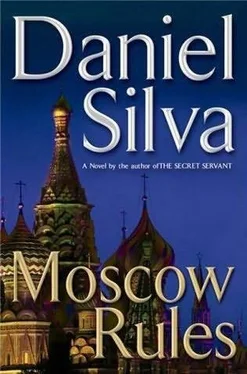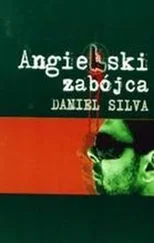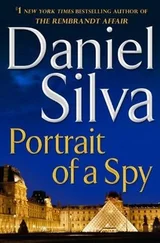Ten minutes later, in Paris, the French president strode before the cameras at the Élysée Palace and announced that a similar round of police raids had been carried out that same morning in the suburbs of Paris and in the South of France. Twenty missiles had been found thus far, ten in an apartment near Charles de Gaulle Airport and ten more on a fishing boat in Marseilles ’s bustling old port. Unlike the British prime minister, who had been circumspect about the origin of the missiles, the French president said it was clear to him that the weapons had been supplied to the terrorists, directly or indirectly, by a Russian source. He also suggested that the French security and intelligence services had played “a major role in foiling the plot.”
Similar scenes played out in rapid succession in Madrid, Rome, Athens, Zurich, Copenhagen, and, finally, on the other side of the Atlantic, in Washington, D.C. Flanked by his senior national security staff, the president told the American people that eight SA-18 missiles had been discovered aboard a motor yacht bound for Miami from the Bahamas and six more had been found in the trunk of a car attempting to enter the United States from Canada. Four suspected terrorists had been detained and were now undergoing interrogation. Based on what had been gleaned thus far, both by American and European investigators, it appeared the plot had been timed to coincide with the Christmas holidays. American and Israeli aircraft were the primary targets of the terrorists, who were hoping to maximize casualties among “the Crusaders and the Jews.” The president assured the American people that the plot had been fully disrupted and that it was safe to fly. The traveling public apparently did not agree. Within hours of the announcement, hundreds of flights were delayed or rescheduled due to an unprecedented wave of passenger cancellations. Airline analysts predicted the news would cause severe financial damage to an already-troubled industry.
By nightfall, all eyes were on Moscow, where the Kremlin had maintained a Soviet-like silence as the story unfolded. Shortly after 11 P.M., a spokesman for the Russian president finally issued a terse statement categorically denying any link between the terrorist plot and legitimate arms sales by Russia to its clients in the Middle East. If the missiles had indeed come from a Russian source, said the spokesman, then it was almost certainly a criminal act-one that would be investigated to the fullest extent possible by Russian authorities. Within a few hours, however, the veracity of the Russian statement was called into question by a dramatic newspaper report in London. It was written by someone the men of the Kremlin knew well: Olga Sukhova, the former editor in chief of Moskovsky Gazeta.
It was among the most intriguing aspects of the entire affair. Kept under virtual house arrest in her Moscow apartment for much of the summer, Olga Sukhova had managed to slip out of Russia undetected, purportedly with the help of an FSB colonel named Grigori Bulganov. After crossing the Ukrainian border by car, the two were spirited to a safe house in England, where they had worked closely with U.S. and British intelligence officers involved in the search for the SA-18 missiles. In exchange for her cooperation, Olga had been granted “a period of exclusivity” regarding certain details of the affair-details she published, in spectacular fashion, in London ’s Telegraph newspaper.
According to her front-page story, the missiles seized by European and American officials had originally been sold to the Democratic Republic of East Africa by Russian businessman and arms trafficker Ivan Kharkov. Kharkov had reportedly concluded the sale with the full knowledge that the weapons were to be transferred to an al-Qaeda affiliate in the Horn of Africa. The article also implicated Kharkov and his now-deceased chief of security, Arkady Medvedev, in the murders of Gazeta journalists Aleksandr Lubin and Boris Ostrovsky.
For the next several days, Olga Sukhova was a fixture on European and American television. So, too, was the man credited with facilitating her escape: Colonel Grigori Bulganov of the FSB. He told tales of rampant corruption inside his old service and warned that the new masters of the Kremlin were nothing but KGB thugs who planned to confront the West at every turn.
By the end of the week, he and Olga Sukhova had both signed lucrative book deals. As for the man at the center of the storm, he was nowhere to be found. Ivan Borisovich Kharkov, real estate developer, venture capitalist, and international arms trafficker, had apparently vanished into thin air.
His assets were quickly seized; his bank accounts quickly frozen. For a time, his grand palaces were surrounded day and night by reporters and cameramen. Finally, when it became clear Ivan was never coming back, the reporters moved on in search of other prey.
The list of countries where Ivan was suddenly wanted for arrest or questioning was long and somewhat ludicrous. There was irony in the situation, of course; even the most jaundiced observer had to admit it. For years, Ivan had callously fueled the deadly civil wars and conflicts of the Third World with little or no interference from the West. But only when he crossed some moral line-when he dared to sell his wares directly to the forces of global Islamic extremism-did the governments of the civilized world sit up and take notice. Even if al-Qaeda had managed to carry out its attack as planned, said one respected commentator, the death toll would have been but a tiny fraction of those killed by Ivan’s guns and bullets in Africa alone.
It was assumed by all that he had taken refuge somewhere inside Russia. How he had managed to get there from France, where he was last seen, was a matter of considerable contention. French aviation officials acknowledged that Ivan’s private jet had departed Côte d’Azur International Airport on the morning of August twenty-sixth, though they refused repeated requests to release a flight plan or complete manifest.The press demanded to know whether French authorities had been aware of Ivan’s activities at the time of the flight. If so, they asked, why had he and his party been allowed to depart?
Confronted with a gathering media storm, French authorities were finally forced to admit that they were indeed aware of Ivan’s involvement in the missile sale at the time of the flight in question, but “certain operational exigencies” required that Ivan be allowed to leave French soil. Those operational exigencies notwithstanding, French prosecutors now wanted Ivan back, as did their counterparts in Britain, where he faced a slew of criminal charges ranging from money laundering to involvement in a plot to commit an act of mass murder. A Kremlin spokesman dismissed the charges as “Western lies and propaganda” and pointed out that it was not possible under Russian law to extradite Mr. Kharkov to face criminal charges. The spokesman went on to say that Russian authorities were completely unaware of Mr. Kharkov’s whereabouts and had no record he was even in the country.
Forty-eight hours later, when a photograph surfaced of Ivan attending a Kremlin reception for the newly reelected Russian president, the Kremlin could not be troubled for a comment. In the West, much was made of the fact that Ivan had attended the reception with a stunning young supermodel named Yekatarina Mazurov rather than his elegant wife. A week later, he filed for divorce in a Russian court, accusing Elena Kharkov of sins ranging from infidelity to child abuse. Elena was not there to contest the charges. Elena, it seemed, had disappeared from the face of the earth.
None of which seemed to concern the staff of the Villa dei Fiori in Umbria, for they had more pressing matters with which to contend. There were crops to bring in and fences that needed mending. There was a horse with an injured leg and a leak in the roof that needed fixing before the heavy rains of winter. And there was a melancholy man with a patch over one eye who feared he would never be able to work again. He could do nothing now but wait. And toss his tennis ball against the Etruscan walls of the garden. And walk the dusty gravel road with the hounds at his heels.
Читать дальше












